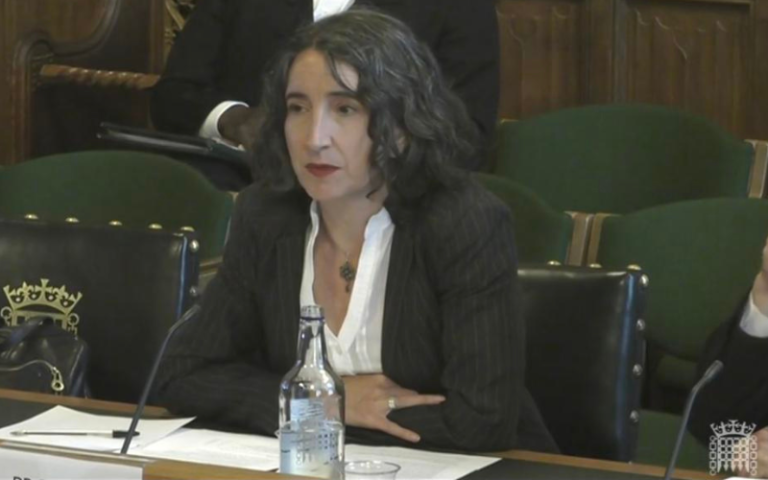Meg Russell tells Commons Administration Committee that MPs must stop talking down parliament
13 June 2023
Constitution Unit Director Professor Meg Russell has given evidence to the House of Commons Administration Committee on how communications about parliament’s work can best be supported.

In oral evidence to the House of Commons Administration Committee on Monday 5 June 2023, Professor Meg Russell stressed the key role played by MPs in protecting the reputation and legitimacy of parliament.
Professor Russell gave evidence as part of the committee’s inquiry into communications and engagement activities provided by the chamber's administration. Chaired by Conservative Charles Walker (also a member of the Privileges Committee), it is seeking to understand the role of the House of Commons in contributing to a positive perception of parliamentary democracy.
Drawing on her detailed research on parliament, Professor Russell highlighted two ongoing challenges to communicating its work:
- Much of parliament’s policy influence happens behind the scenes, for example in meetings between MPs and ministers. While many formal parliamentary activities are transcribed and broadcast, the institution’s real influence on government therefore often happens privately, including inside the governing party.
- Second, much of parliament’s activity on the public record does not comprise decision-making activities, but is nonetheless crucial in holding the government to account. For example, question times, backbench and opposition debates put ministers on the spot and require them to explain themselves publicly, operating through powers of ‘exposure’ and ‘anticipated reactions’. This encourages ministers and civil servants to think policy through carefully in advance.
Hence much crucial parliamentary activity is difficult to communicate due to its subtlety. But the fact that the government has to explain itself to parliament and be held accountable in a public place is enormously important.
Another particular challenge, Professor Russell suggested, is that parliamentarians themselves often talk down the work of parliament:
- Both government and opposition frequently contend or imply that parliament makes little impact. It does not suit ministers to highlight how parliament has impacted on their policy, and the opposition (of any political persuasion) often prefers to complain about the powerlessness of parliament.
- Recent times have also seen particular assaults on parliament by senior politicians. Professor Russell reminded the committee of ministerial comments that parliament is ‘dead’ and ‘has no moral right to sit’ (former Attorney General Geoffrey Cox); that ‘if parliament were a school OFSTED would be shutting it down’ (former Prime Minister Boris Johnson); or that the UK has been ‘paralysed by a broken parliament’ (Conservative manifesto 2019). (Boris Johnson’s resignation statement impugning the reputation of the Privileges Committee was published a few days after the hearing.)
These are challenges that could not be easily overcome by even the very best media relations officer.
On the question of what the House of Commons administration can do to better communicate parliament’s work, Professor Russell began by suggesting that communications (including on the administration side) should be defined broadly. For example:
- House of Commons Library briefings, produced first and foremost for MPs, are a great resource in helping a wider public to understand what is happening in parliament because they are published online.
- The Parliamentary Studies module for undergraduate students, supported by the Commons authorities and co-taught by academics and parliamentary officials at around 20 universities (including UCL), is an important strategic intervention by parliament in communicating its work. Hundreds of students pass through this programme every year, many of whom will go on to work in the media, civil service, voluntary sector – or in parliament itself.
So a key question is whether there is another imaginative strategic intervention that the House of Commons could make to improve communications, beyond the obvious media relations work. Professor Russell suggested induction sessions that discourage MPs from publicly undermining parliament’s reputation. Instead MPs should be encouraged to communicate the importance of parliament as our central democratic institution, and as a collective institution in which political questions are resolved (but where obviously not everybody agrees).
On the more obvious communication/media matters Professor Russell also highlighted some areas in which the communication of the work of parliament is going well, and made some proposals for improvement:
- It is clear that there is currently good and well-coordinated media work about the House of Commons select committees, which appear prominently on the website. The public appreciates such bodies, not least because they can work across party.
- Activities such as departmental questions deserve better communication. While most people know about Prime Ministers’ Questions (for good or ill), few know about these question times, which can be a sensible exchange and clear form of accountability on details of policy, but which are difficult to find on the website and not regularly promoted.
- Some other basic bits of information seem difficult to find on the parliamentary website. For example there is no simple way to see which government bills are at which stage in each chamber, nor to view a list of private members’ bills active at each stage.
- The newsfeed for the House of Commons includes different items to that for the House of Lords, and the Lords is notably better at reporting progress on government bills. It would be worthwhile to talk to officials in the Lords about what can be learnt from their communications.
Key links:
- Watch the session back
- Read the full transcript of the session
- Read the Constitution Unit briefings on constitutional principles and the health of democracy.
 Close
Close

